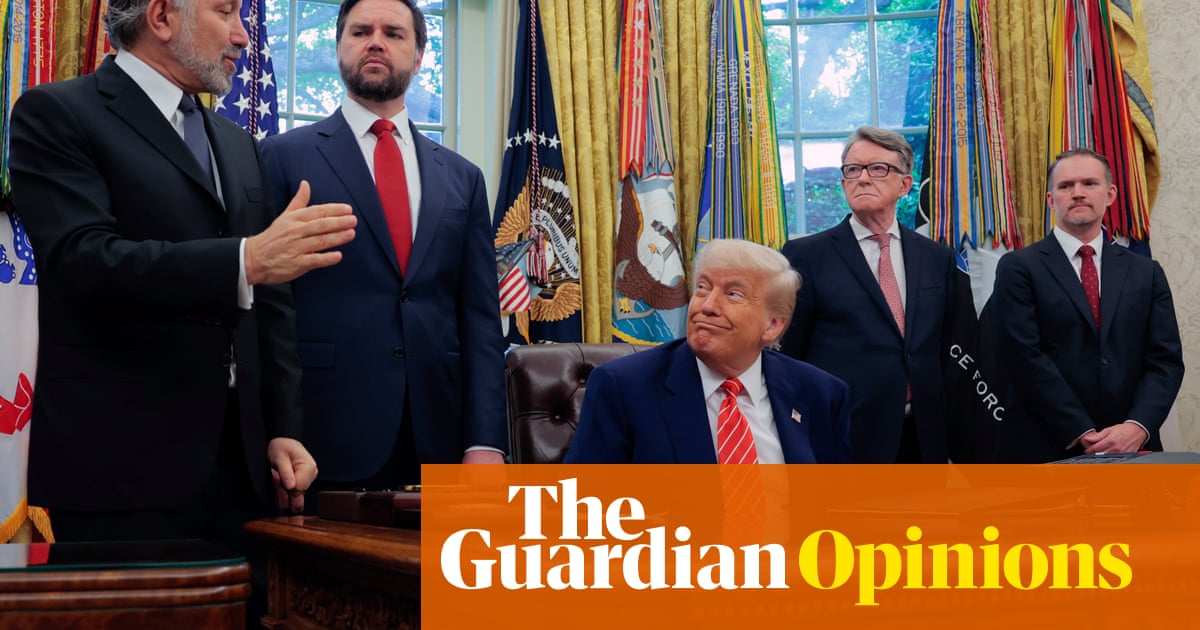Ahuge day in import-export yesterday, as even Rome’s billion-per-cent tariff on American popes was lifted. The much bigger news, though, concerned the partial easing of recently imposed import taxes on British goods in the form of a starterUK-US trade deal, leaving the biggest little country in the world basking in the glow of an achievement our own prime minister seemed to hint had something of VE Day to it. In Britain, we have an old saying about dejection – “you look like you’ve lost a pound and found a sixpence” – but this was an entirely new spin on that scenario, given we were mostly celebrating being back to paying 10% more tariffs than we were subject to a few weeks ago. Yessss! A sixpence! Good times.
Before we get to the specifics of the deal, the theatre. I do find myself increasingly mesmerised by Trump’s Oval Office tableaux, which typically feature him surrounded by a cluster of sniggering mooks (eg the vice-president). Trump is like the boss in a cartoon about a crew of gangster dogs. Like Fat Sam from Bugsy Malone – but a bloodhound-chinese crested cross. Call him The Dogfather. So yes: the big dog was seated at his desk, while the henchdogs stood awkwardly round ready to laugh obsequiously on cue. And, bless them, they hit every single one. On this occasion, the boss dog was basking in their oleaginously indulgent chuckles, but you get the feeling that on a bad day it could go quite the opposite way. “Shaddup, Vance, you idiot. Did I say you could snigger?” “No, boss. Sorry, boss.”
Anyway, to each mook his day. Surgically removing his own dignity live on TV with no anaesthetic was Howard Lutnick, the former Cantor Fitzgerald CEO turned commerce secretary, who at one point burbled: “I want to make this clear. This was the president’s deal. People think, ‘Oh, that’s not the way it works.’ If you got to sit next to him – I have the BEST dealmaker to my left. And if you don’t think that we take advantage of him calling the prime minister and getting that deal done, you don’t understand who’s the president. He’s the closer. He gets deals done that we could never get done, because he understands business, he understands deals. And that’s why we’re here today.”
Watching this speech, I was seized by the powerful apprehension that this was the buildup to a musical number. It had all the hallmarks – Lutnick becoming suddenly more animated and mannered, his delivery even slowing slightly, until the only thing missing was the striking up of the band for the debut of your new ear-worm song, He’s the Closer!
Lutnick: Well, here’s a poser …
Vance: Just who’s the closer?
Lutnik: Could it be …?
Vance: Yes, it could!
Lutnick: He’s our orange bulldozer!
(Keir Starmer joining in over speakerphone for the second chorus.)
Anyway: the deal, which was either “maxed out” or “the end of the beginning”, depending on whether you were listening to the boss dog or the British ambassador, Peter Mandelson. It was understandably received very well in the car factories of the West Midlands, but less so in the outrage-manufacturing plant presided over by the Conservative leader, Kemi Badenoch. “Keir Starmer called this ‘historic’,” she posted. “It’s not historic, we’ve just been shafted!” Ooooooh! I think it’s better when party leaders don’t talk like this – it’s certainly less of an excruciating cringe for everyone else. But my working theory is that Kemi Badenoch has decided to spend her tenure as Tory leader either calling for things she could have done but didn’t when her party was in power, or explaining why you’d never catch her doing anything anyone might regard as an achievement by her rivals. I’d give her six months, tops – potentially in dog years.
“The US and UK have been working for years to try and make a deal and it never quite got there,” declared Trump as Starmer joined the announcement remotely. “It did with this prime minister, so I want to just congratulate you.” Most compliments from Trump have the potential to be a stab in the back, and this one may yet turn out to be a lesson in being careful what you wish for. The UK-US trade deal has been an El Dorado-just-around-the-next-corner for so long that notions of its capabilities and value have grown outsized in the public imagination. To have heard all the prime ministers who couldn’t close it talk, it could save us from decline, it could sweep away all the losses incurred by severing ties with all our nearest geographical neighbours, it could make us the rich global buccaneers we once were. Time after time over the past few years, politicians keen to get us to live on the never-never have suggested that just as soon as they landed it, it might be the answer to everything.
As the prime minister who did land it, Keir Starmer now has to return the public imagination to the realms of reality by November, when the budget will surely bring both tax rises and spending cuts, which have somehow not been headed off by ensuring the price of a Range Rover Evoque is only quite a bit higher instead of quite a lot higher. It’s probably best he starts managing expectations on that front sooner rather than later. To the victor go the spoilers.
Marina Hyde is a Guardian columnist
